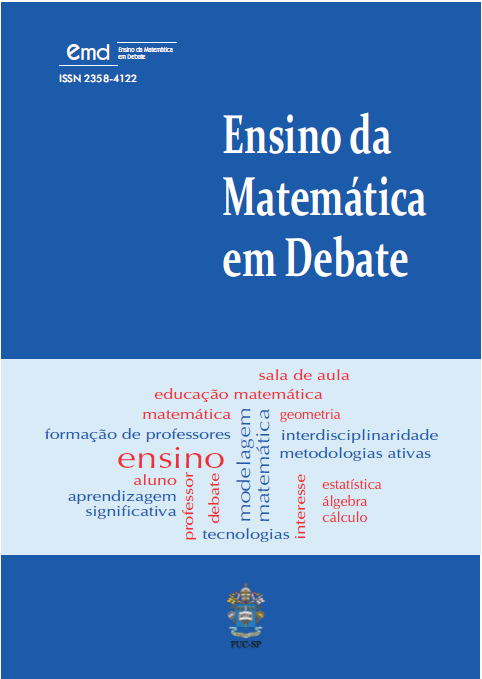Questões de Urgência Social em Aulas de Matemática nos Anos Iniciais do Ensino Fundamental
Palavras-chave:
Ensino de Matemática, Papel Social da Matemática, Anos Iniciais, Competências da BNCC, Urgência SocialResumo
No presente artigo, apresentamos os resultados de uma pesquisa que objetivou investigar as percepções de professores que ensinam Matemática nos anos iniciais do Ensino Fundamental em relação à maneira como inserir as questões de urgência social em aulas de Matemática com as crianças no pós-pandemia. Utilizamos uma abordagem qualitativa para descrever e interpretar as informações que foram constituídas por meio de um questionário online – Google Docs, o qual foi respondido por 40 professores que ensinam Matemática nos anos iniciais em uma disciplina do PPGECM/UNEMAT, campus de Barra do Bugres/MT, no ano de 2022, intitulada: Ensino de Matemática nos Anos Iniciais. A partir das respostas obtidas com o questionário, realizamos uma sistematização dos dados por meio da Análise de Conteúdo na perspectiva de Bardin (1977) e Rodrigues (2019), a qual nos proporcionou a constituição de 10 unidades de registro que foram articuladas entre si, por meio de confluências e divergências, para a configuração de três Categorias de Análise, sendo: i) Aspectos Curriculares do Ensino de Matemática; (ii) Postura dos Alunos nas aulas de Matemática; (iii) Práticas Pedagógicas de Professores que Ensinam Matemática, pelas quais realizamos nossa interpretação, por meio de um movimento dialógico, para nos proporcionar a compreensão do objeto investigado. Os resultados indicam que, para serem incluídas as questões de urgência social em sala de aula, os professores que ensinam Matemática nos anos iniciais precisam alterar o modelo tradicional e linear de ensino por um modelo dialógico, inclusivo e humanista, cujo foco seja o desenvolvimento do Letramento Matemático, para que os alunos utilizem os conceitos matemáticos para entender e analisar criticamente as situações dos seus cotidianos e realidades, ou seja, utilizar a Matemática para explicar e entender o mundo.
Referências
BARDIN, L. Análise de conteúdo. Lisboa: Edições 70, 1977.
BICUDO, M. A. V; MARTINS. J. Estudos sobre existencialismo, fenomenologia e educação. 2. ed. São Paulo: Centauro, 2005.
BRASIL. Base Nacional Comum Curricular (BNCC): Educação é a Base. Brasília, 2018.
CRESWELL, J. W. Projeto de pesquisa: métodos qualitativo, quantitativo e misto. 3. ed. Porto Alegre: Artmed, 2010.
D’AMBROSIO, U. Educação Matemática: da teoria à prática. 16. ed. São Paulo: Papirus, 2010.
D’AMBROSIO, U. Etnomatemática: elo entre as tradições e a modernidade. Belo Horizonte: Autêntica, 2001.
D’AMBROSIO, U. Por que se Ensina Matemática. São Paulo, 2004. 9 p. Disponível em: https://edisciplinas.usp.br/mod/resource/view.php?id=3254544&forceview=1 Acesso em: 06 maio 2023.
FAUSTINO, A. C.; PASSOS, C. L. B. Cenários para investigação e resolução de problemas: reflexões para possíveis caminhos. Revista Educação e Linguagens, v. 2, p. 62-74, 2013.
FRANKENSTEIN, M. Educação Matemática Crítica: uma aplicação da Epistemologia de Paulo Freire. In: BICUDO, M. A. V. (org.). Educação Matemática. 2. ed. São Paulo: Centauro, 2005.
FREIRE, P. Pedagogia da autonomia: saberes necessários à prática educativa. São Paulo: Paz e Terra, 1996.
LOPES, C. A. E. Literacia estatística e o INAF 2002. In: FONSECA, M. C. F. R. (org.). Letramento no Brasil: habilidades matemáticas. São Paulo: Global: Ação Educativa Assessoria; Pesquisa: Instituto Paulo Montenegro, 2004. p. 187-197.
MATHIAS, C. E. M. Um Olhar Humanista sobre os Números Complexos. In: ROQUE, Tatiana; GIRALDO, V (org.). O Saber do Professor de Matemática: Ultrapassando a Dicotomia entre Didática e Conteúdo. 1. ed. Rio de Janeiro: Ciência Moderna, 2013. v. 1, p. 107-146.
MORAES, M. S. S. et al. Temas político-sociais/transversais na educação brasileira: o discurso visa à transformação social? Ciência Geográfica, Bauru, SP, v. 9, n. 2, p. 199-204, 2003.
RICHIT, A. Formação de Professores de Matemática da Educação Superior e as Tecnologias Digitais: aspectos do conhecimento revelados no contexto de uma comunidade de prática online. 286 f. Tese (Doutorado em Educação Matemática) – Universidade Estadual Paulista, Rio Claro, SP, 2015.
ROCHA, T. S. F.; LIMA, I. M. S. Diálogo em aulas de Matemática: um estudo a partir do olhar de professoras que ensinam nos anos iniciais do ensino fundamental. Educação Matemática Pesquista, São Paulo, v. 23, n. 2, p. 356-383, 2021.
RODRIGUES, M. U. (org.). Análise de conteúdo em pesquisas qualitativas na área da educação matemática. Curitiba: CRV, 2019.
ROOS, L. T. W. Histórias de Vida e Saberes Construídos no Cotidiano de uma Comunidade de Fumicultores: Um Estudo Etnomatemático. Reflexão e Ação, Santa Cruz do Sul, RS, v. 10, n. 1, p. 39-45, jan./jun. 2002.
SANTOS, G. L. C. Educação Financeira: a Matemática Financeira sob nova perspectiva. 2005. Dissertação (Mestrado em Educação para a Ciência) – Faculdade de Ciências, Universidade Estadual Paulista, Bauru, SP, 2005.
SILVA, A. M; POWELL, A. B. Um programa de educação financeira para a matemática escolar da educação básica. Anais do XI ENEM – XI Encontro Nacional de Educação Matemática, Curitiba, 2013.
SKOVSMOSE, O. Cenários para investigação. Bolema, Rio Claro, SP, n. 14, p. 66-91, 2000.
SKOVSMOSE, O. Desafios da reflexão em Educação Matemática Crítica. Campinas, SP: Papirus, 2008.
SKOVSMOSE, O. Educação Matemática Crítica: a questão da democracia. 2. ed. Campinas, SP: Papirus, 2004.
SKOVSMOSE, O. Matemática em ação. In: BICUDO, M.; BORBA, M. C. (org.). Educação matemática: pesquisa em movimento. São Paulo: Cortez, 2004.
SKOVSMOSE, O. Um Convite à Educação Matemática Crítica. Tradução de O. A. Figueiredo. Campinas, SP: Papirus, 2014.
Downloads
Publicado
Como Citar
Edição
Seção
Licença
Copyright (c) 2023 Ensino da Matemática em Debate

Este trabalho está licenciado sob uma licença Creative Commons Attribution-NonCommercial 4.0 International License.

Este obra está licenciado com uma Licença Creative Commons Atribuição 4.0 Internacional.






